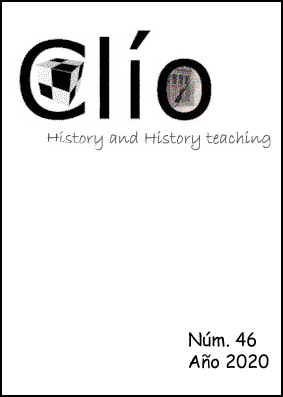Teaching the Holocaust: a pedagogical opportunity to reflect on the present social conflicts.
DOI:
https://doi.org/10.26754/ojs_clio/clio.2020465300Keywords:
Pedagogy of the Holocaust, Present social conflicts, Education in history and social responsibility, Secondary education, Museographic speeches about nazi concentration camps.Abstract
After a field experience on guided tours in a nazi concentration camp and an intervention in several fourth course secondary education lessons, some difficulties have been detected within the pedagogy of the Holocaust which are previous to the aims of this one: analyzing the marginalisation and the extermination of who was considered “different” in order to reflect on the current exclusions and discriminations. With the aim of solving those problems, it is proposed in this study an alternative approach to the treatment of the Holocaust in lectures: in the first place, paying due attention to those collectives which were victims of this potential violence, without the establishment of hierarchies regarding the level of suffering. Secondly, having an impact on the responsibility that we as people have in connection with these acts of violence and social injustices in order to contribute to the training of a critical citizenship, solidary and respectful.
Downloads
References
Alaize, B. (2009). L'ensenyament de la Shoah a l'escola francesa: reptes pedagògics i de memòria. En J. Pagès y M. González (Coords.), Història, memoria i ensenyament de la historia; perspectives europees i llatinoamericanes (pp. 69-81). Universitat Autònoma de Barcelona.
Bauer, Y. (2006). El Holocausto: Lo singular y lo universal. https://www.yadvashem.org/es/ education/educational-materials/lesson-plans/january-2006/yehuda-bauer.html
López Facal, R. y Santidrian, V. (2011). Los conflictos candentes en el aula. Iber. Didáctica de las Ciencias Sociales, Geografía e Historia, 69, 8-20.
Pagès, J. y Casas, M. (2005): Republicans i republicanes als camps de concentració nazis. Testimonis i recursos didàctics per a l’ensenyament secundari. Institut d’Educació de l’Ajuntament de Barcelona.
Prats, J. y Santacana, J. (2011). Didáctica de la Geografía y la Historia. En J. Prats (Coord.), Por qué y para qué enseñar Historia (pp. 13-27). Graò.
Suarez Álvarez, M. (2012). La enseñanza del Holocausto en Bachillerato: Reflexiones y Propuestas. https://www.yadvashem.org/es/education/educational-materials/proposals/ reflections.html
UNESCO (2015). La Situación internacional de la enseñanza del Holocausto: panorama mundial en los manuales escolares y los planes de estudios, resumen. https://unesdoc.unesco.org/ark:/48223/pf0000233964_spa
UNESCO (2013). ¿Por qué enseñar sobre el Holocausto? http://cprtrujillo.juntaextremadura.net/public/Memoria_SHOA/4%20UNESCO%20FOLLETO%20HOLOCAUSTO.pdf
Valls, R., Parra, D. y Fuertes, C. (2017). Los temas históricos conflictivos y su abordaje escolar: un ejemplo español. Clío & Asociados: La Historia Enseñada, 25, 8-21. https://doi.org/10.14409/cya.v0i25.6917
Downloads
Published
How to Cite
Issue
Section
License
Copyright (c) 2020 Guadalupe Lopez Mateu

This work is licensed under a Creative Commons Attribution-NonCommercial-ShareAlike 4.0 International License.
This work is licensed under a Creative Commons Attribution-NonCommercial-ShareAlike 4.0 International License.
Copyright remains the property of authors. Permission to reprint must be obtained from the authors and the contents of JoS cannot be copied for commercial purposes. JoS does, however, reserve the right to future reproduction of articles in hard copy, portable document format (.pdf), or HTML editions of JoS.






